Share
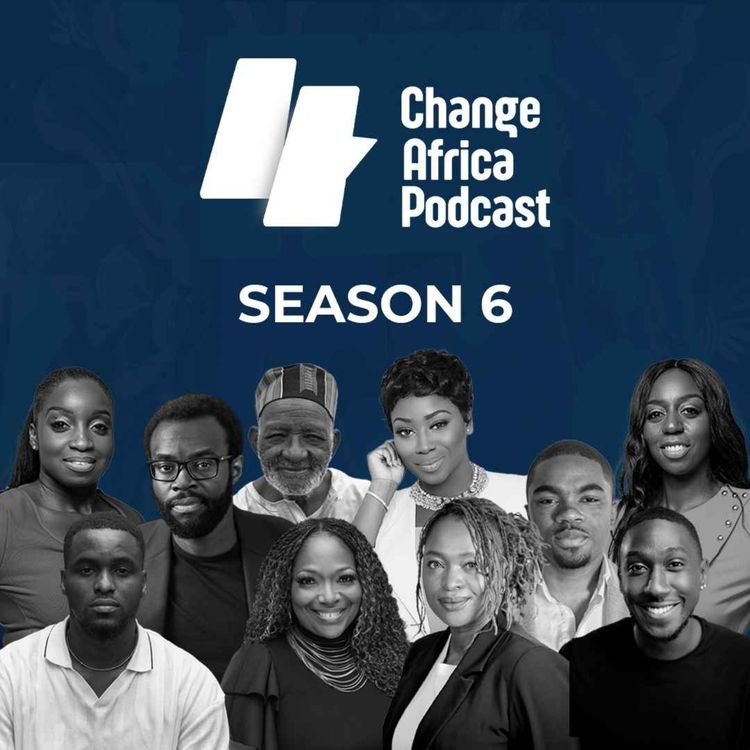
Change Africa Podcast
Shadrack Frimpong: Creating A Blueprint For Sustainable Rural Development in Africa
In this episode, we speak with Shadrack Frimpong, a global leader and academic, on his remarkable journey in impact and community development in Africa. Shadrack founded Cocoa360, a nonprofit organization whose mission is to facilitate access to education and improve health care through cocoa farming revenue. Shadrack has a PhD, an honorary doctorate, and two master's degrees and is currently in medical school training to be a physician.
Shadrack's story begins in Tarkwa Breman, Ghana, where he was born to a peasant cocoa farmer and a charcoal seller. Despite his economic background, Shadrack has always shown remarkable leadership. From co-founding a Scholarship and Talents Club in high to guiding dozens of students in accessing global educational opportunities to Students for a Healthy Africa and the African Research Academies for Women, Shadrack is deeply committed to addressing crucial issues like health care and education in Africa.
Our conversation centres on his unique approach to poverty alleviation. He challenges prevalent misconceptions and emphasizes the centrality of healthcare in addressing poverty. His critique extends to the inefficiencies in current resource allocation and the often misguided focus of development programs. Shadrack believes financial aid alone does not suffice in poverty alleviation; health and well-being are equally critical.
Cocoa360, his nonprofit, is a testament to Shadrack's innovative approach. This model ingeniously integrates healthcare, education, and cocoa farming, enabling communities to sustain their health and educational needs through agricultural activity. This self-sustaining model departs from traditional aid systems, promoting community-driven development and empowerment.
Shadrack expounds on issues in the cocoa value chain, such as child labour and underpayment and how their model keeps children in school and brings parents to the farm. He also discusses the complexities of policy and advocacy in improving the lives of cocoa farmers.
With Cocoa360 as a template and armed with research in medicine and development, Shdrack wants to create a scalable blueprint for sustainable community development in Africa.
More episodes
View all episodes

10. Peace Hyde: Redefining African Storytelling Through Purpose and Power
01:01:59||Season 6, Ep. 10In this episode of the Change Africa Podcast, host Isaac Aboah sits down with Peace Hyde, award-winning creator, executive producer, and one of the leading voices in African media, for a powerful conversation on creative risk, storytelling, and the future of African cinema.Peace traces her inspiring journey from being a high school science teacher in the UK to launching Young, Famous & African, the first-ever African reality show on Netflix. Through this journey, she unpacks how storytelling has become her tool for reshaping the world’s view of Africa, championing authenticity, and building platforms that elevate African talent.The episode delves into the behind-the-scenes aspects of Africa’s creative economy, from the production challenges of large-scale shows to the lack of funding, infrastructure, and distribution that hinder African filmmakers. Peace also reflects the mindset required to navigate failure and fame, emphasizing purpose, faith, and resilience as essential ingredients for sustainable success.Whether you’re a young creative, a media founder, or a believer in Africa’s global potential, this episode offers invaluable insight into how to build something bigger than yourself and redefine the narrative of a continent.Chapters00:00 – Introduction to Change Africa Podcast 01:56 – Peace Hyde: A Journey Through Media and Storytelling 08:52 – The Concept of Risk and Purpose in Career 15:00 – Authenticity in Storytelling and Production 20:57 – Challenges in African Film Production 30:06 – Bridging Gaps in African Film Talent 32:23 – Investing in African Talent and Infrastructure 34:13 – The Importance of Distribution in African Cinema 35:39 – Global Viewership and African Narratives 39:03 – Redefining Africa's Image Through Storytelling 43:14 – Navigating Success and Failure in Media 46:30 – Faith and Decision-Making in Creative Ventures 50:34 – Mindset and Resilience for the Next Generation 56:22 – Vision for the Future of African CinemaFurther Reading and ResourcesWatch Young, Famous & African on NetflixLearn more about Peace Hyde's work via peacehyde.comFollow Peace on Instagram and X (formerly Twitter): @PeaceHydeThis podcast is a production of Nexa Media.Do you have a question for our hosts? Email us at changeafricapod@gmail.comFollow the podcast on Twitter, Facebook, Instagram, and LinkedIn.
9. Paakow Essandoh: Bridging Cultures Through Fashion and the Power of Representation
50:57||Season 6, Ep. 9In this episode of the Change Africa Podcast, host Isaac Aboah sits down with Paakow Essandoh, founder of the celebrated fashion brand Mizizi, to explore the power of fashion as a tool for cultural identity, diaspora connection, and creative entrepreneurship.Paakow shares how Mizizi was born out of his quest to reconnect with African heritage after feeling culturally disconnected growing up in the diaspora. What started as a passion project quickly became a global brand celebrating African pride through bold designs, cultural storytelling, and authentic community engagement.The conversation explores the challenges of building a culturally sensitive brand, the role of collaboration and music in expanding reach, and how Mizizi navigated its rise from social media buzz to partnerships with major cultural institutions like Marvel. Paakow emphasizes the value of persistence, adaptability, and surrounding yourself with the right people to grow sustainably.From personal identity to global impact, this episode highlights how fashion can help reclaim narratives, build movements, and reshape how Africa is seen, both by the world and by its diaspora.Episode Summary00:00 – Introduction to Change Africa Podcast01:01 – Paakow Essandoh: Bridging Cultures Through Fashion05:03 – The Journey of Entrepreneurship08:59 – Grappling with Identity and Blackness12:03 – Promoting African Culture Through Fashion13:02 – The Launch of Mizizi and Initial Success16:02 – Evolving the Brand and Cultural Sensitivity19:09 – Media Attention and the Rise of Mizizi20:54 – Sustaining Success in African Fashion23:06 – Collaborations and Future Directions23:50 – Building Connections Through Music and Fashion26:29 – The Impact of African Culture on the Diaspora29:02 – Collaborating with Marvel: A Journey of Persistence38:08 – The Role of People in Business Success41:27 – The Talent and Potential of African Creatives45:48 – The Future of African Creativity and Global RepresentationFurther Reading and ResourcesExplore Mizizi at mizizishop.comDiscover how Mizizi partnered with Marvel and other global brandsLearn more about diaspora fashion and storytelling via The Folklore and OkayAfricaThis podcast is a production of Nexa Media.Do you have a question for our hosts? Email us at changeafricapod@gmail.comFollow the podcast on Twitter, Facebook, Instagram, and LinkedIn.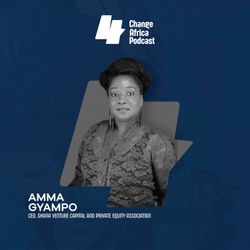
8. Amma Gyampoh: Transforming Africa Through Impact, Innovation, and Local Power
01:02:39||Season 6, Ep. 8In this episode of the Change Africa Podcast, host Isaac Aboah sits down with Amma Gyampoh, founder and CEO of Scale Up Africa, for a compelling conversation on digital transformation, agriculture, entrepreneurship, and rethinking finance across the continent.Amma shares how her work in e-government and digital systems in the UK shaped her approach to African development. She reflects on her decision to return to Ghana and the transformative potential of solving problems “amidst the obvious,” especially in agriculture, where she believes distribution is everything.The discussion dives into African startups' structural challenges, from infrastructure and funding gaps to misaligned investor expectations. Amma champions a shift in mindset and capital, calling for decolonized financing, better collaboration among investors, and deeper engagement from local pension funds and family offices in shaping Africa’s future.This episode also explores gender lens investing, the untapped power of tourism and the creative economy, and why local decision-making is critical to sustainable entrepreneurship. Amma makes a powerful case for aligning capital with context and systems with sovereignty.Chapters00:00 – Introduction to Change Africa Podcast01:01 – Amma Gyamoh: Founder of Scale Up Africa02:46 – Digital Transformation Experience in the UK05:26 – Transitioning to Ghana: Motivations and Challenges08:23 – Addressing Agricultural Challenges in Africa12:25 – The Importance of Distribution in Agriculture15:32 – Building Startups: Differences Between Africa and the UK18:14 – Investor Perspectives on Infrastructure and Funding21:12 – Impact Investing Ghana: Collaborative Efforts25:30 – Unlocking Local Pension Funds for Impact Investments30:01 – Engaging Wealthy Families in African Tech Opportunities31:04 – Unlocking Entrepreneurial Potential34:29 – Challenges in the Startup Ecosystem39:31 – Integrating Solutions Across Sectors41:12 – Shifting Power Dynamics in Funding45:54 – Transforming Tourism and Creative Industries51:26 – Decolonizing Finance and Impact Investing56:40 – Building a Sustainable Future for AfricaFurther Reading and ResourcesLearn more about Amma Gyampoh’s work through Scale Up Africa.Explore Impact Investing Ghana, a platform promoting collaboration in inclusive finance.Check out AVCA and the Ghana Venture Capital Trust Fund for additional context on investing in African startups.Read more on gender lens and decolonial investing at Criterion Institute.This podcast is a production of Nexa Media.Do you have a question for our hosts? Email us at changeafricapod@gmail.comFollow the podcast on Twitter, Facebook, Instagram, and LinkedIn.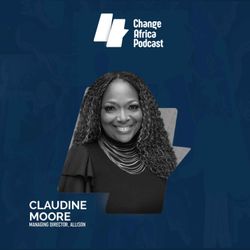
7. Claudine Moore: Connecting Africa Through PR, Culture, and the Diaspora
01:05:28||Season 6, Ep. 7In this episode of the Change Africa Podcast, host Isaac Aboah is joined by guest Claudine Moore, a trailblazer in global PR and communications, to explore how branding, cultural intelligence, and the diaspora can shape Africa’s future.Claudine shares her personal and professional journey, from growing up in the UK with strong Pan-African values to founding C. Moore Media and eventually leading it to acquisition by global firm Allison. Her work has centered on amplifying authentic African narratives and building bridges between the continent and its global communities.The conversation delves into how tourism and sports can drive economic growth, foster cultural pride, and reshape Africa’s global image. Claudine emphasizes the role of storytelling and branding in addressing skewed Western perceptions of Africa, highlighting that many of the continent’s challenges are rooted in how it is framed to the world.This episode also touches on the significance of the Africa Business Cultural Intelligence Report, an inaugural topline report for global and pan-African businesses and organizations with the business cultural intelligence and local market knowledge required to thrive in Africa’s dynamic and rapidly growing markets. We explore the promise of intra-African trade and the importance of corporate social responsibility. Claudine highlights the untapped potential of the African diaspora, the need for investment in Africa's youth, and why Africa must prioritize people over profit in its development strategies.From the DRC’s mineral wealth to the rise of African talent in global sports, this conversation paints a powerful picture of how culture, business, and identity intersect in the continent’s growth story.Chapters00:00 – Introduction to Change Africa Podcast 01:02 – Claudine Moore: A Journey of Connection to Africa 03:08 – The Impact of the African Diaspora 08:40 – Starting Seymour Media: A New Chapter 13:23 – Navigating Acquisitions in PR 22:26 – Allison: Expanding Horizons 25:29 – Africa Business Cultural Intelligence Report 30:07 – Tourism and Sports: A Cultural Connection 33:18 – The Impact of Sports on African Culture and Economy 37:43 – Education and Technology: Preparing Africa's Youth for the Future 41:28 – Opportunities and Responsibilities in the Democratic Republic of Congo 49:01 – US-Africa Relations: The Role of the Diaspora 55:08 – Intra-African Trade: Bridging Gaps and Building ConnectionsFurther Reading and ResourcesLearn more about Claudine Moore’s work and initiatives at C. Moore Media and Allison.Read the Africa Business Cultural Intelligence Report here. This podcast is a production of Nexa Media.Do you have a question for our hosts? Email us at changeafricapod@gmail.comFollow the podcast on Twitter, Facebook, Instagram, and LinkedIn.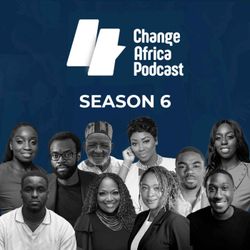
6. Sisters Leading Change in Real Estate Investing in Africa
52:12||Season 6, Ep. 6In this episode of the Change Africa podcast, host Isaac Aboah sits down with sisters Anna and Victoria Agyekum, co-coordinators of On Point Property Management, to explore the growing world of real estate in Ghana and the critical role of the diaspora in shaping the sector’s future.The conversation opens with the sisters sharing their unexpected journey into real estate, grounded in their cultural roots and entrepreneurial upbringing. Together, they unpack the unique challenges diaspora investors face, from trust gaps to limited access to information, and highlight why Ghana presents a powerful investment opportunity with its political stability and emerging economy.Anna and Victoria speak candidly about high interest rates, mortgage access, and infrastructure issues and propose public-private partnerships as a vital part of the solution. They emphasize that affordability must be understood from the perspective of multiple market demographics and call attention to the need for better planning to position Ghana as a potential world-class city.Throughout the episode, the sisters stress the role of technology, sustainability, and community development in the future of real estate. They also reflect on the impact of real estate expos in educating buyers and empowering local and diaspora communities.This episode captures the intersection of culture, entrepreneurship, and future-focused urban development, showing how real estate can become a tool for transformation across Africa.Chapters00:00 – Introduction to Change Africa Podcast01:56 – Sisters in Business: The Jakum Story06:03 – Cultural Roots and Influences09:52 – Identifying the Real Estate Problem14:04 – Benefits of Investing in Ghana18:14 – Comparative Real Estate Markets21:53 – Challenges in the Ghanaian Real Estate Market25:58 – The Future of Real Estate Investment in Ghana26:57 – Navigating Interest Rates and Mortgage Accessibility28:28 – Infrastructure Development and Real Estate Opportunities31:07 – Understanding Affordability in the Real Estate Market33:42 – The Role of Expos in Real Estate Education37:28 – Sustainability and Community Investment in Real Estate44:15 – Envisioning the Future of Urbanization in Africa47:04 – The Impact of Technology on Real Estate DevelopmentFurther Reading and ResourcesTo learn more about Anna and Victoria's company, visit their website. Learn more about the Ghana Property & Lifestyle Expo 2025 here. This podcast is a production of Nexa Media.Do you have a question for our hosts? Email us at changeafricapod@gmail.comFollow the podcast on Twitter, Facebook, Instagram, and LinkedIn.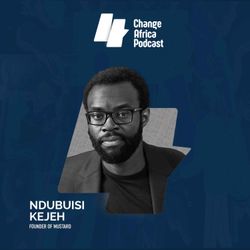
5. Ndubuisi Kejeh: The Power of Storytelling in Building Global Brands
56:57||Season 6, Ep. 5In this episode of the Change Africa podcast, host Isaac Aboah is joined by guest Ndubuisi Kejeh to explore the powerful role of storytelling in building global brands and driving transformation across the African continent.The conversation begins with exploring how narratives shape consumer behavior and brand identity. Ndubuisi highlights storytelling as a fundamental tool in marketing, company building, politics, and culture. Together, they examine the emotional core of consumerism, the success of global campaigns like Coca-Cola and Red Bull, and how African brands can learn from these models while maintaining authenticity.The dialogue touches on the economic opportunities tied to Afrobeats and African products, emphasizing that narrative-led strategies can help African entrepreneurs access global markets and change consumer perceptions. The discussion also critiques the venture capital model in Africa, arguing that it may not be fully suited to the continent’s economic realities and calling for context-specific funding strategies.Beyond business, the episode explores storytelling’s influence in politics, proposing that narrative can unify new political movements. The idea of a “third force” in African politics is discussed as a possibility powered by effective communication, leadership, and narrative cohesion.Ndubuisi and Isaac reflect on the moral dimension of marketing and influencer culture, advocating for a human-centered approach to influence and leadership. The episode ultimately affirms that storytelling is a catalytic force for reshaping Africa’s image, inspiring entrepreneurship, and igniting collective belief in possibility.Chapters00:00 – Introduction to Change Africa Podcast01:01 – The Importance of Storytelling in Business02:12 – The Power of Narratives in Company Building05:52 – Successful Storytelling Campaigns12:01 – Mastering Consumer Goods and Brand Building18:48 – The Future of Consumerism and Morality22:31 – Critique of the Venture Capital Model in Africa29:56 – Economic Opportunities in Afrobeats and African Products32:33 – The Power of Storytelling in Politics39:39 – Creating a Third Force in African Politics43:32 – Building Global Brands from Africa50:08 – Perceptions and Branding Challenges in AfricaFurther Reading and ResourcesTo learn more about Ndubisi’s venture builder, Mustard, and its story-led approach, visit their website. This podcast is a production of Nexa Media.Do you have a question for our hosts? Email us at changeafricapod@gmail.comFollow the podcast on Twitter, Facebook, Instagram, and LinkedIn.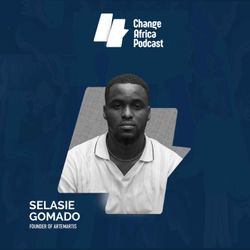
4. Selasi Gomado: Bridging Artists and Markets
01:08:50||Season 6, Ep. 4This episode of the Change Africa podcast features Selasie Gomado, founder and creative director of Artematis, a Ghanaian art collective and agency driving the continent’s artistic renaissance.Selasei begins by tracing his early love for drawing, stifled by familial expectations to pursue engineering, a path he followed until a post-university epiphany sparked Artematis. What started as an online art shop in 2018, born from a random thought in a car ride, has grown into a dynamic collective showcasing five artists globally, from London to Hong Kong.Selasie recounts the rocky early days—six months of no sales—until a friend’s advice to tap into Ghanaians’ love for experiences led to the first Full Moon Exhibition. With 300 attendees and a single sale, it was a modest validation that shifted Artematis toward events. The momentum of 2019 screeched to a halt with COVID-19, nearly ending the venture. But a personal brush with the virus in 2021 became a turning point. Bedridden and reflective, Selasie recommitted to managing artists full-time, quitting his engineering job after signing with Phillips Auction House for a landmark 2022 London show.The discussion pivots to the artists of Artematis—Hawa Awanle Ayiboro, Abdur Rahman Muhammad, Kwaku Yaro, James Mishio, and Courage Hunke—each pushing boundaries with unique materials and themes. From Hawa’s vivid depictions of women’s struggles to Courage’s fusion of paper and plastic waste, Selasi highlights their growth from emerging to established talents. He reflects on the challenge of balancing structure with creative chaos, a dance he navigates with patience and an open mind.Selasie situates Artematis within Ghana’s thriving art scene, crediting pioneers like KNUST’s arts department and galleries such as 1957 for creating “third spaces” that democratize art. Yet, he notes a persistent hurdle: local art collecting lags, with over 90% of sales to foreigners. The episode closes with a hopeful vision for African art’s future—rooted in quality, documentation, and experimentation—underscoring Selasi’s belief that its foundations are still being built.Chapters00:00 Introduction to Change Africa Podcast01:01 Selasi Gomadu and Artomatis: A Journey into Art03:01 The Evolution of Artomatis and Its Impact06:01 Challenges and Triumphs in the Art Scene09:04 Navigating the Art Market: Strategies and Insights12:00 The Role of Community in Artist Development15:03 Defining Great Art and the Artist's Journey17:59 Fostering Creativity and Managing Artists21:07 Success Stories and Growth in the Art Collective23:47 Behind the Scenes of Art Exhibitions26:56 Experimental Approaches in Contemporary Art30:00 The Future of Artomatis and the Ghanaian Art Scene35:50 Building Connections in the Art World39:38 Challenges in the Art Industry44:58 The Role of Galleries in Community Engagement47:03 The Evolving Culture of Art Collection in Ghana50:49 Supporting Artists' Mental Health53:39 Spotlight on Emerging Artists01:06:30 The Future of Art in AfricaFurther Reading and ResourcesTo explore Selasi’s world further:Visit Artematis’ website (assumed URL) for artist profiles and upcoming shows.Read Rebecca Ann Proctor’s 2021 article that spotlighted Artematis, Explore Ghana’s art scene through Gallery 1957 and Nubuke Foundation, key players mentioned by Selasi.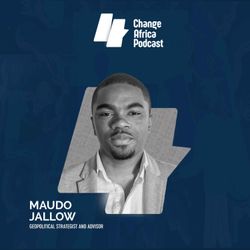
3. Maudo Jallow: Rewiring Africa’s Strategic Playbook in Global Geopolitics.
59:52||Season 6, Ep. 3In Episode 3 of Season 6, Change Africa Podcast hosts Isaac Aboah and Daniel Merki sit down with Maudo Jallow, a geopolitical strategist advising governments in the Middle East and Africa on strategy, public policy, and geopolitics. Jallow unpacks the intricate dance of global power, from GCC(Gulf Cooperation Council (GCC) influence in Africa to the continent’s untapped leverage in a multipolar world. The conversation tackles how African leaders can navigate partnerships with emerging players like the UAE, sidestep colonial hangovers, and build a pragmatic future rooted in competence and self-interest. They explore the dynamics of international partnerships, the role of independent organizations, and the challenges African leaders face in negotiating beneficial agreements. The conversation also touches on the historical influence of colonial powers and the current efforts of the US to regain influence in Africa amidst rising competition from China and the UAE. This conversation explores the shifting dynamics of global influence, particularly focusing on the roles of the UK and US in Africa, the fragility of international law, sustainable development challenges, and the importance of attracting talent for governance. Maudo urges African leaders to wield data-driven leverage in negotiations, tap diaspora talent, and prioritize GDP per capita as a development yardstick—offering a playbook for a continent ready to rewrite its story.Chapters00:00 Introduction to Change Africa Podcast01:01 Geopolitical Landscape in the GCC Region06:44 Africa as a Geopolitical Playground11:26 The Role of Independent Organizations19:09 Navigating Colonial Legacies in Africa30:20 US Influence and Relationships in Africa30:48 The Shifting Global Influence of the UK and US35:49 The Role of International Law and the UN39:50 Sustainable Development and Resource Management in Africa44:21 UK's Economic Role in Africa: Debt Relief and Cultural Influence47:17 Future Development Outcomes for Africa50:32 Pragmatic Approaches to Foreign Investment in Africa54:37 Attracting Talent for Governance in Africa58:26 Personal Aspirations and Future DirectionsGuest ProfileMaudo Jallow is an experienced geopolitical strategist and advisor, with 7 years of experience in advising governments in the Middle East and Africa on strategy, public policy, and geopolitics. Previously, he worked for the Boston Consulting Group (BCG) as a Senior Analyst in the Global Advantage Practice Area, providing expert advice and insights on how MEA nations can attract strategic foreign investment in key sectors. Maudo holds a Bachelor’s degree in International Business with French from the European Business School in London and a Master’s degree in African Development from the London School of Economics and Political Science (LSE), where he also served as a Visiting Fellow at the Firoz Lalji Institute for Africa. This podcast is a production of Nexa Media.Do you have a question for our hosts? Email us at hello@changeafricapodcast.comFollow the podcast on Twitter, Facebook, Instagram, and LinkedIn.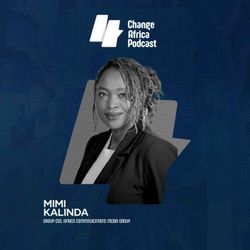
2. Mimi Kalinda: Reshaping Africa's Narrative
01:04:11||Season 6, Ep. 2In this episode of the Change Africa podcast, host Isaac Aboah and co-host Daniel Merki engage with Mimi Kalinda, a global communication specialist, to explore the importance of storytelling in reshaping Africa's narratives. Mimi reflects on her career, the complexities of African culture, and the power of narratives in influencing perceptions and behaviors. She emphasizes the need for culturally nuanced communication and the role of storytelling in problem-solving and transformational change across the continent. The conversation delves into the importance of building authentic African narratives, the role of crisis management in collective action, and the necessity for government leaders to embrace storytelling as a strategic tool. It highlights the lessons learned from past crises, particularly in the context of the Ebola outbreak and COVID-19, emphasizing the need for a cohesive narrative that aligns with the realities on the ground. The discussion also touches on the challenges of measuring the impact of storytelling and the importance of preparing for future crises. This conversation explores the significance of crisis communication, the power of storytelling in leadership, and the importance of embedding storytelling within organizational culture. It emphasizes the need for adaptability in crisis situations and the role of reputation management.Episode Summary00:00 Introduction to Storytelling in Africa02:57 Reflections on Accomplishments and Future Goals06:08 Understanding Africa's Complex Narratives09:02 Storytelling as a Tool for Problem Solving12:00 The Power of Narratives in Shaping Perceptions14:55 Childhood Influences and the 1994 Turning Point20:52 Career Milestones and Impactful Projects24:02 Building African Narratives27:00 Crisis Management and Collective Action29:59 Government Leadership and Storytelling33:59 The Importance of Strategic Communication38:57 Measuring Impact in Storytelling42:09 Crisis Communication Lessons Learned44:34 Crisis Communication and Adaptability49:10 The Power of Storytelling in Leadership52:12 Embedding Storytelling in Organizational Culture55:26 The Importance of Preserving African Stories01:00:20 The Dangers of Ignoring Our HeritageFurther Reading and ResourcesMimi Kalinda's book, "Talking to Africa: Considering Culture in Communications for a Complex Continent," is available for purchase at AmazonVisit Mimi Kalinda's website at mimikalinda.com for more information on her work and access her upcoming book, "Echoes of Influence: Harnessing The Power of Storytelling As A Leadership Strategy."This podcast is a production of Nexa Media.Do you have a question for our hosts? Email us at hello@changeafricapodcast.comFollow the podcast on Twitter, Facebook, Instagram, and LinkedIn.Watch on YouTube